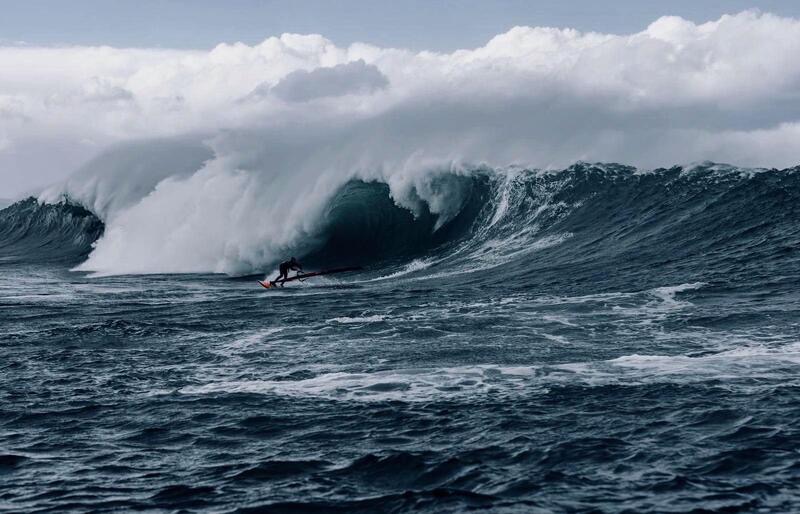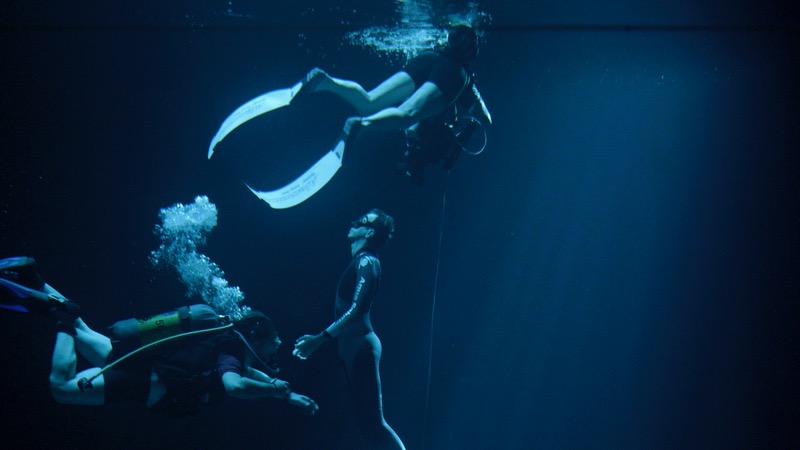
From stormy waves to inner depths: the films at centre stage on the Ocean Film Festival UK Tour

The Storm Chaser is a short film: one of eight currently touring the UK as part of The Ocean Film Festival. It is a documentary of sorts, directed by British film-maker Jack Pirie and narrated by French windsurfer Thomas Traversa (38). The film follows Traversa as he travels to the Galician coast and proceeds to surf in the midst of a massive Atlantic storm. The camera closely tracks him as he surfs effortlessly over crested waves with storm clouds raging above. To say that it’s an exhilarating watch feels like a bit of an understatement.
“It was important that you don’t know that he’s a windsurfer until the end,” Jack says. “But somebody told me, ‘I was watching it and wondering what was going to happen. Then I saw him walking to the sea and thought oh my God, he’s going in.’ I never thought that the film would provoke that kind of reaction, with people telling me that their jaw was practically on the floor.”
Nevertheless, this has always been The Ocean Film Festival’s mission: to provoke those kinds of reactions. It was founded in Australia, in 2012, with the aim of both reminding people of how visually spectacular the ocean can be and raising environmental awareness. The founder, Jemima Robinson summed this up when she said: “We started the Ocean Film Festival World Tour with big dreams, not only to inspire the world to explore and enjoy our oceans, but also protect and respect them.”
Yet the films currently listed on the UK tour programme sometimes diverge from that ethos. UK tour manager Rosie Fuller explains that they occupy an atypical genre of “ocean film.”
“The ocean is a broad subject matter,” Rosie says. “It could include adventures, extreme conditions, conservation projects or maybe wildlife. But this year the films have gone down the personal route. They’re about people’s personal journeys and what the ocean means to them. It’s really, really interesting.”
Jack Pirie began making The Storm Chaser with this in mind. It was important to him to eschew the over-the-top drama of a typical extreme sports movie and take the “personal route”. He achieves this by foregrounding Thomas Traversa’s personality on screen and by having him do a voice over throughout the film.
“What struck me about Thomas is that he was a very thoughtful and earnest person,” Jack says. “That interested me: I could combine the chaotic weather with the peace and tranquillity when he talks. He’s not a risk taker either. He doesn’t revel in the idea of ‘doing something crazy today’. I liked that. I thought it was different from typical perceptions of extreme sports stars.”
In Broken Breath (a film also showing at the festival) Italian film-maker Morgan Bertacca uses the ocean as more of a metaphor: telling an emotional story about Mike Maric (50), a former champion free-diver. The film recounts how Maric lost one of his closest friends at the height of his career. This tragedy eventually led to his retirement from free-diving and a new career as a breath scientist. The documentary consists of an edited interview with Maric, archive footage of his free-dive competitions and atmospheric recurring shots of him swimming through shadowy water: shots that were filmed at ‘Y-40 Deep Joy’ in Padua, the deepest indoor-thermal-pool in the world.
Morgan explains that he wanted these diving scenes to represent Mike Maric “diving into his subconscious”. The shots required the darkening of the pool with black drapes as well as other preparatory measures, so that they could be as visually stunning as possible.
“Underwater shootings are very different from traditional ones,” Morgan reflects. “Even in the simplest of shots the paradigm of each movement changes, so a good cameraman must be at first an excellent diver. The light also reacts very differently, so the cinematographer must know how to illuminate the set. The director must also have a very clear idea of what he wants.”
Morgan’s ideas of presenting the “subconscious” were akin to some of Jack Pirie’s ambitions for The Storm Chaser. Near the end of the film, a gigantic VFX bird made of storm-clouds pursues Thomas Traversa over the waves. Jack saw this as a way to represent the storm, and Traversa’s reverence for it, in a “non-literal way” while crossing over into the realm of the imagination, as he will often do in his work.
But Jack also balanced his abstract ideas with a very physical style of film-making. At the Galician coast he directed Traversa’s personal camera team as they followed Traversa, through the storm, on a jet-ski and stayed as close to him as possible.
“They wouldn’t usually do that because you get a lot of very shaky camera footage,” Jack says. “But that chaos is what we wanted. We wanted dynamism and for it to feel rough. There are those moments in the film where you are right there, you see the spray and you see him. It’s madness but it ended up working really well.”
Broken Breath and The Storm Chaser focus closely on Maric and Traversa without making much reference to environmental issues. This is somewhat unlike other documentaries at The Ocean Film Festival, like The Custodians: a film that ardently promotes conservationism. Nonetheless Jack thought lots about these issues while he made The Storm Chaser.
“Thomas and I talked at length about sustainability,” he says. “But in the end it felt too forced as a thing just to throw on top. What I liked was representing one person’s relationship with the natural world and also how we, as humans, engage with forces greater than ourselves. I liked that the film was just a visceral slice of making you feel something.” The environmental themes are perhaps subtle then, but still present in The Storm Chaser.
The Ocean Film Festival team themselves promote conservationism by collaborating with many charities. When attendees of the festival emerge from watching the films, they’ll have the opportunity to speak with representatives, including some from the Marine Conservation Society. Tour manager Rosie Fuller says, “quite a lot of the feedback we get from the shows is that people want more stalls in the foyer. It very much feels like a community event. People really want to be involved and learn more.”
With this in mind we could well say that the films shown at the festival are very successful thus far in their mission. Morgan Bertacca says that films with strong characters can “directly communicate environmental issues to a wide audience” and it would seem that for most, The Ocean Film Festival achieves this objective in affecting the way that its audiences think.
“I am personally interested in the ideas of philosopher Yuval Noah Harari,” Morgan adds. “He says that human societies are driven by their collective imagination and that the power of humans lies in their ability to believe in, what he calls, ‘fictions.’”
This idea will undoubtedly continue to be important, as more films about the natural world are made in the future. But now all that we as audience members can do is to stay as open as we can to the messages that they provide.
Post a comment